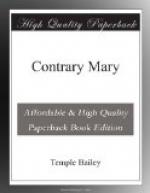I am beginning to understand that the woman in the home has a freedom which she doesn’t sufficiently value. She can run down-town in the morning; or slip out in the afternoon, or put off until to-morrow something which should have been done to-day. But men can’t run out or slip away or put off—no matter if the sun is shining, or the birds singing, or the wind calling, or the open road leading to adventure.
Yet there are compensations, and I am trying to see them. I am trying to live up to my theories. And I am sustained by the thought that at last I am a wage-earner—independent of any one—capable of buying my own bread and butter, though all masculine help should fail!
Aunt Isabelle is a dear, and so is Susan Jenks. And that’s another thing to think about. What will the wage-earning part of the world do, when there are no home-keepers left? If it were not for Aunt Isabelle and Susan, there wouldn’t be any one to trail after me with cushions for my tired back, and cold things for me to drink on hot days, and hot things to drink on cool days.
I begin to perceive faintly the masculine point of view. If I were a man I should want a wife for just that—to toast my slippers before the fire as they do in the old-fashioned stories, to have my dinner piping hot, and to smooth the wrinkles out of my forehead.
That’s why I’m not sure that I should make a comfortable sort of wife. I can’t quite see myself toasting the slippers. But I can see Constance toasting them, or Leila—but Grace and I—you see, after all, there are home women and the other kind, and I fancy that I’m the other kind.
This, you’ll understand, is a philosophy founded on the vast experience of a week in the workaday world—I’ll let you know later of any further modification of my theories.
Well, the house seems empty with just the three of us, and Pittiwitz. I miss Constance beyond words, and the beautiful baby. Constance wanted to name her for me, but Gordon insisted that she should be called after Constance, so they compromised on Mary-Constance, such a long name for such a mite.
We all went to New York to see them off. By “all,” I mean our crowd—Aunt Frances and Grace, Leila and the General—oh, poor little Leila—Delilah and Colin Quale, Aunt Isabelle and I, Susan Jenks with the baby in her arms until the very last minute—and Porter Bigelow.
At the boat Leila went all to pieces. I could never have believed that our gay little Leila would have taken anything so hard—and it was pitiful to see Barry. But I can’t talk about that—I can’t think about it.
Porter was dear to Leila. He treated her as if she were his own little sister, and it was lovely. He took her right away from the General, when the ship was leaving the dock.
“Brace up, little girl,” he said; “he’ll be back before you know it.”
He literally carried her to a taxi and put her in, and then began such a day. We did all of the delightful things that one can do in New York on a summer day, beginning with breakfast at a charming inn on Long Island, and ending with a roof garden at night. And that night Leila was so tired that she went to sleep all in a minute, like a child, and forgot to grieve.




